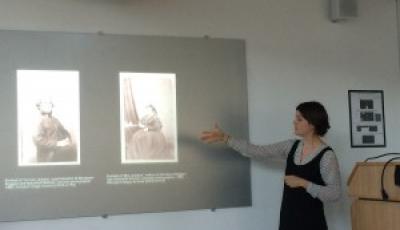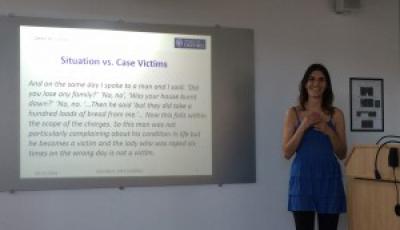On Thursday, 18 June 2015, the Centre for Criminology held a colloquium for its DPhil students. Attended by Centre graduate students, as well as academic and research staff, the day proved a great opportunity for the DPhil students to present on their work and for attendees to learn about the different types of research being carried out. The speakers demonstrated their ability to present their research in an accessible way to others, as well as fielding questions from the floor. It prompted much thought-provoking discussion during the lunch break, and inspired suggestions for further reflection and development.

Having jetted in 36 hours earlier from her fieldwork in the Netherlands, Rachel Wechsler showcased her project, ‘Understanding Sex Trafficking Victims’ Experiences with the Criminal Justice System in the Netherlands.’ She discussed how she obtained access to her fieldwork site, an Amsterdam-based shelter, to be able to interview victims of sex trafficking. Her work aims not only to give a voice to this vulnerable group, but has a wider purpose of informing policy in such a way that the criminal justice system can better support trafficking victims and be more attentive to their needs in the prosecution process.

Gabrielle Watson then spoke about her doctoral work which looks at situating the concept of ‘respect’ in criminological research. She outlined where respect is considered―and where it’s omitted―in research on contemporary criminal justice, locating her study in the absence of literature on this topic. Gabrielle discussed one of her thesis chapters on the significance of prison meals, referencing literature on cooking in prisons, force-feeding, and preparation rituals in relation to the concept of respect. She then applied this conceptual framework to the issue of prison meals and the rules governing them, looking in closer detail at the variety of prison meal menus, the standards of storage, and the various dietary requirements (such as Halal meat, veganism, and cravings of prisoners in detox programmes).

Rudina Jasini then spoke in detail about contextualising victim participation in international criminal proceedings, which she was motivated to study from her work with victims in Cambodia. She described three components of her fieldwork: looking at trial proceedings, interviewing legal practitioners, and interviewing victims. Her research found numerous challenges of integrating victim participation in the context of international criminal courts. Rudina argued that if victims are granted the right to participate, the court must develop consistent procedures and sufficient resources early on in the process to define and encourage participation in a balanced manner.
The colloquium concluded with an enthusiastic presentation by Sylvia Rich, asking ‘can corporations be criminals?’ She gave an overview of her thesis, exploring the requirements for an agent to be eligible for treatment under criminal law. Sylvia described in detail what constitutes a rational agent, aided by comparisons to a cat(!), and argued that an agent needs a certain type of mental state, the capacity to act, and the ability to understand the moral dimension of its choices.
Overall, the day showcased a fascinating variety of projects, each demonstrating how far-reaching the journey of DPhil research can be, as well as the wide-ranging nature of criminological research.
